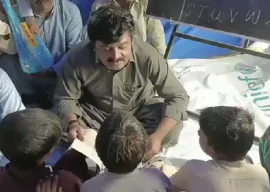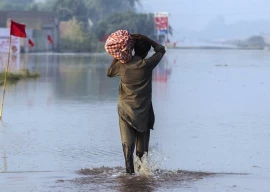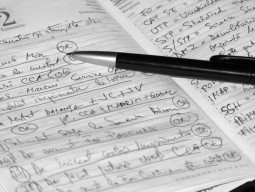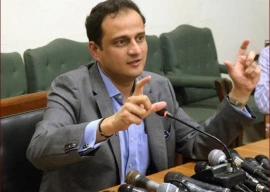
Residents of Mori, a small village in Shikarpur, the Jameel family was among thousands of people who refused to acknowledge that a flood was heading their way.
“Our neighbours said there was no threat of floods,” Jameel’s wife, Rani Lal, says helplessly, “We have lost everything.”
It was a late escape with the floodwater literally at their heels. The family had no time, or space, to take their livestock with them.
Jameel’s younger brother loaded a donkey cart, piling some basic necessities, and the family set off. “It was chaotic leaving our village, everyone was on the roads,” Jameel told The Express Tribune, “And the water was everywhere. At one point, the donkey stopped and refused to move.”
The family sat helplessly on the cart as the water on the road continued to rise.
“The water rose to nearly three feet in three hours,” the 34-year-old recalls. “We thanked God when a rescue team finally arrived.”
The family was brought to a refugee camp near the Naz Bypass in Sukkur. The camp is being run by the Pakistan Air Force with the help of the district administration.
Nights at the camp are long, the days are bleak and boring.
Jameel’s children, Zumeena, Robeena, Nazar and Momina, who were playing outside the tent provided by the National Commission for Human Development (NCHD), come inside as soon as the sun sets. The family must have dinner before it gets too dark.
Dinner is limited, water is scarce. The family had managed to grab onto nine rotis when the ration was distributed by the jawans. The camp had no proper water supply but Rani had found an empty water bottle lying outside the camp on the road. “I knew there was a water pump at a distance of a 20-minute walk so I cleaned the bottle and since then we have been storing water in it,” Rani narrates.
However, one bottle is not enough for 13 people and as was inevitable, one of the children was at the end of the line. When the empty water bottle reached him, he burst into tears but not much could be done at that point. Rani scolds him gently and asks him to sleep.
The four children curl up on the muddy ground and are quiet.
The family explains that the sheet provided to them by the camp management was not big enough to go all around the tent floor. The elders get to sleep on the covered part while the children are relegated to muddier nights.
People at the camp seem to have divided into three groups, which talk and fret about the past, present and future.
Most women live in the past, recalling what they had and what had happened to it. “The flood must have destroyed everything we had, our homes, our crops,” Jameel’s sister, Durkha says.
For the men, it is the future that hangs over their heads like an overbearing dark cloud. “What if my landlord asks for the money that I have borrowed from him?” he worries, wondering how the family will recuperate after the water goes away and they get back to their broken homes.
The only ones living in the present are the children who talk of the day’s events and busy themselves with day to day relief good grabbing. Jameel’s eight-year-old Nazar narrates the day’s highlight, “This short uncle was really nice, he gave me a toffee and some bread.”
Published in The Express Tribune, September 19th, 2010.



1724406196-0/BeFunky-collage]_____-(87)1724406196-0-165x106.webp)













COMMENTS
Comments are moderated and generally will be posted if they are on-topic and not abusive.
For more information, please see our Comments FAQ